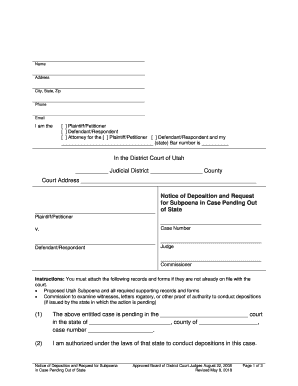The Influence of Technology on the Effectiveness of Letters Rogatory Processes
The Influence of Technology on the Effectiveness of Letters Rogatory Processes
Blog Article
What You Need to Learn About Letters Rogatory in Cross-Border Cases

Meaning of Letters Rogatory
Letters rogatory are official requests made by a court in one territory to the proper judicial authority in another jurisdiction, seeking help in acquiring proof or serving legal records. This lawful tool is specifically substantial in cross-border situations where straight interaction in between judicial authorities is either not practical or not allowed because of lawful constraints.
Usually, letters rogatory are made use of in criminal and civil matters, permitting courts to ask for the collection of testament, files, or other significant products from outside their jurisdiction. When a court identifies the need for evidence that can not be collected locally, the procedure starts. Following this, the asking for court prepares an official letter describing the details information or activity needed, making certain compliance with both territories' legal requirements.
Once submitted, the recipient court examines the request and carries out the needed procedures according to its own regulations (Letters rogatory). The efficiency of letters rogatory counts heavily on global treaties and agreements, which promote collaboration amongst nations. This mechanism underscores the relevance of common lawful support in promoting justice throughout borders, guaranteeing that lawful procedures are not prevented by geographical boundaries
Function and Value
Assisting in global cooperation, letters rogatory offer a critical function in the world of cross-border lawful procedures. They function as official requests from a court in one territory to a court in another, looking for help in gathering proof or performing evaluations significant to a case. This mechanism is vital when a party requires to get statement or records situated outside their very own jurisdiction, ensuring that legal processes are not impeded by geographical limits.
The value of letters rogatory can not be overemphasized, as they play a crucial function in promoting the integrity of lawful systems across countries. By providing a structured approach for global partnership, these letters assist to preserve respect for each and every nation's sovereignty while facilitating the exploration procedure necessary for fair trials. They likewise make sure that proof is collected in a way that abides by the legal standards and treatments of the requesting territory.

Refine of Issuing Letters Rogatory
The procedure of issuing letters rogatory entails a number of key steps that have to be diligently followed to guarantee conformity with both residential and global legal criteria. Originally, a demand for support need to be prepared, describing the particular evidence or statement sought from the international jurisdiction. This request needs to plainly specify the facts of the situation, the significance of the proof, and the lawful basis for the demand.
When the request is prepared, it is generally Discover More sent to a domestic court or relevant authority for approval. The court might assess the request to guarantee it follows procedural needs and straightens with worldwide treaties or conventions regulating mutual lawful support.
Upon authorization, the demand is formally equated right into the language of the international territory, as needed - Letters rogatory. Ultimately, the letters rogatory are sent out to the suitable foreign authority, often via diplomatic channels or main authorities designated for such functions
Obstacles and Limitations
In cross-border lawful proceedings, navigating the difficulties and restrictions of letters rogatory can considerably affect the efficiency of proof gathering. One significant challenge is the differing legal standards and step-by-step demands throughout jurisdictions. Various countries may have distinctive regulations relating to the admissibility of proof, which can make complex the execution of letters rogatory.
Additionally, the moment required to refine these requests can be significant. Delays in the foreign territory might prevent prompt access to crucial evidence, which can endanger the overall instance. Language obstacles additionally present considerable challenges; guaranteeing accurate translation of papers and testament is vital but can present prospective misconceptions and additional problems.
In addition, there is often a lack of reciprocity in the treatment of letters rogatory. Some jurisdictions might not acknowledge or focus on such demands, resulting in possible rejections or insufficient compliance. Political or diplomatic considerations may also impact the desire of an international nation to work together, especially in sensitive situations. These obstacles require cautious preparation and consideration by legal experts participated in cross-border lawsuits.
Best Practices for Legal Professionals
Reliable methods for lawyers browsing letters rogatory in cross-border cases can considerably enhance the chance of effective proof gathering. It is essential to completely comprehend the lawful frameworks and procedural needs of both territories involved. This understanding will help in composing a clear and exact demand that straightens with the obtaining country's legal standards.
Following, establishing strong communication with foreign lawful reps can promote the procedure. Involving regional advice that know with the nuances of their legal system can provide vital insights and aid navigate possible risks. It is also beneficial to include extensive information regarding the evidence sought, making sure that it is appropriate and required for the instance.

Final Thought
In summary, letters rogatory serve as a vital mechanism for acquiring evidence in cross-border legal issues. Inevitably, recognizing the nuances of letters rogatory is necessary for legal experts engaged in international lawsuits.
Letters rogatory play a crucial role in helping with the exchange of evidence throughout global borders, serving as a bridge in between diverse legal systems. As we explore finest practices and the subtleties of this legal device, it becomes clear that proficiency of letters rogatory is indispensable for reliable worldwide legal practice.
In cross-border legal proceedings, browsing the difficulties and constraints of letters rogatory can dramatically affect the effectiveness of evidence event.Efficient methods for legal professionals navigating letters rogatory in cross-border instances can significantly boost the probability of effective proof event.In summary, letters rogatory serve as a crucial system for obtaining proof in cross-border lawful matters.
Report this page